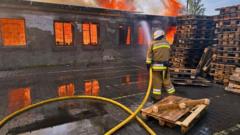As the Russia-Ukraine conflict continues, recent insights reveal that although Russian soldiers are weary from prolonged combat, they are adamant about achieving complete territorial control over disputed regions in Ukraine before considering a cease-fire. This sentiment reflects a complex and challenging landscape for the Kremlin.
Russian Soldiers Demand More as War Fatigue Sets In

Russian Soldiers Demand More as War Fatigue Sets In
Russian troops express reluctance to accept a cease-fire without territorial gains, exposing domestic turmoil for the Kremlin.
By Anatoly Kurmanaev
Reporting from Berlin
May 17, 2025, 5:53 a.m. ET
In the ongoing dialogue regarding the conflict in Ukraine, criticism is growing among Ukrainians and their European allies, who accuse President Trump of making excessive concessions to Russia to facilitate a peace agreement. However, perspectives from Russian troops at the frontline tell a different story.
In recent interviews, eleven Russian soldiers who are currently engaged or have previously fought in Ukraine expressed significant doubts about recent peace talks that marked the first direct negotiations in three years. They unanimously dismissed Ukraine's proposal for an unconditional cease-fire, asserting that Russian military efforts should persist at least until all four territories in southern and eastern Ukraine—primarily claimed but only partially controlled by Russia—are secured.
“We’re all tired, we want to go home. But we want to take all of the regions, so that we don’t have to struggle for them in the future,” stated Sergei, a soldier deployed in the eastern Donetsk area, emphasizing the stakes involved. “Otherwise, have all the guys died in vain?”
These insights offer a rare glimpse into the morale within the Russian military and highlight the domestic challenges President Vladimir V. Putin may face should he consider ending the war on terms that fail to meet the expectations of his forces and their nationalist supporters. Many soldiers believe the annexations from earlier in the conflict could limit potential negotiation options going forward, as anything less than full control could be perceived as capitulation.
Images and reports from the conflict zones depict significant ongoing battles, with Ukrainian forces pushing back against Russian advances, further complicating the negotiations and the soldiers’ positions on the ground. As peace talks continue, the pressures on the Kremlin from within its ranks may influence the broader geopolitical landscape, demanding careful navigation of both military and diplomatic considerations.
Reporting from Berlin
May 17, 2025, 5:53 a.m. ET
In the ongoing dialogue regarding the conflict in Ukraine, criticism is growing among Ukrainians and their European allies, who accuse President Trump of making excessive concessions to Russia to facilitate a peace agreement. However, perspectives from Russian troops at the frontline tell a different story.
In recent interviews, eleven Russian soldiers who are currently engaged or have previously fought in Ukraine expressed significant doubts about recent peace talks that marked the first direct negotiations in three years. They unanimously dismissed Ukraine's proposal for an unconditional cease-fire, asserting that Russian military efforts should persist at least until all four territories in southern and eastern Ukraine—primarily claimed but only partially controlled by Russia—are secured.
“We’re all tired, we want to go home. But we want to take all of the regions, so that we don’t have to struggle for them in the future,” stated Sergei, a soldier deployed in the eastern Donetsk area, emphasizing the stakes involved. “Otherwise, have all the guys died in vain?”
These insights offer a rare glimpse into the morale within the Russian military and highlight the domestic challenges President Vladimir V. Putin may face should he consider ending the war on terms that fail to meet the expectations of his forces and their nationalist supporters. Many soldiers believe the annexations from earlier in the conflict could limit potential negotiation options going forward, as anything less than full control could be perceived as capitulation.
Images and reports from the conflict zones depict significant ongoing battles, with Ukrainian forces pushing back against Russian advances, further complicating the negotiations and the soldiers’ positions on the ground. As peace talks continue, the pressures on the Kremlin from within its ranks may influence the broader geopolitical landscape, demanding careful navigation of both military and diplomatic considerations.






















